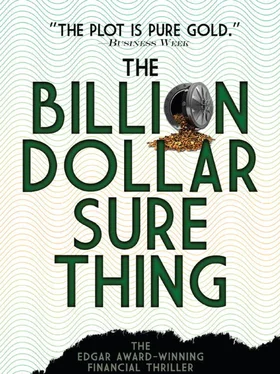Paul Erdman - The Billion Dollar Sure Thing
Здесь есть возможность читать онлайн «Paul Erdman - The Billion Dollar Sure Thing» весь текст электронной книги совершенно бесплатно (целиком полную версию без сокращений). В некоторых случаях можно слушать аудио, скачать через торрент в формате fb2 и присутствует краткое содержание. Город: Mineola, Год выпуска: 2018, ISBN: 2018, Издательство: Dover Publications, Inc., Жанр: Триллер, на английском языке. Описание произведения, (предисловие) а так же отзывы посетителей доступны на портале библиотеки ЛибКат.
- Название:The Billion Dollar Sure Thing
- Автор:
- Издательство:Dover Publications, Inc.
- Жанр:
- Год:2018
- Город:Mineola
- ISBN:978-0-48682-811-4
- Рейтинг книги:3 / 5. Голосов: 1
-
Избранное:Добавить в избранное
- Отзывы:
-
Ваша оценка:
- 60
- 1
- 2
- 3
- 4
- 5
The Billion Dollar Sure Thing: краткое содержание, описание и аннотация
Предлагаем к чтению аннотацию, описание, краткое содержание или предисловие (зависит от того, что написал сам автор книги «The Billion Dollar Sure Thing»). Если вы не нашли необходимую информацию о книге — напишите в комментариях, мы постараемся отыскать её.
Paul Erdman’s fast-paced, suspenseful story centers on a billion-dollar, top-secret coup intended to protect the U.S. dollar. In settings that range from Washington, D.C., to London, Paris, Moscow, and Beirut, a cast of memorable characters enact a plot that brings the world to the brink of the biggest financial explosion in history.
The Billion Dollar Sure Thing — читать онлайн бесплатно полную книгу (весь текст) целиком
Ниже представлен текст книги, разбитый по страницам. Система сохранения места последней прочитанной страницы, позволяет с удобством читать онлайн бесплатно книгу «The Billion Dollar Sure Thing», без необходимости каждый раз заново искать на чём Вы остановились. Поставьте закладку, и сможете в любой момент перейти на страницу, на которой закончили чтение.
Интервал:
Закладка:
Within fifteen minutes Bernoulli was asleep. This was not exactly the Euler, but a bed was a bed.
8
THE church bells bonged. Six-thirty. A few minutes later the light in the cell was turned on from somewhere, the door opened, and a warden shoved in a broom. Door closed and locked. Bernoulli’s cellmate began unwinding himself from the narrow bed, looked over to Bernoulli, and grinned.
“Bonjour!”
“ Guete Tag ,” replied Bernoulli in the local Swiss dialect.
“Aha. Un Bâlois ,” said his roommate, who then continued in heavily accented, though excellent, German. “My name is Sammy Bechot. You new here?”
“Right. I’m George Salzmann,” replied Bernoulli, “and this is the first time I’ve had the privilege of enjoying the hospitality of the Lohnhof.”
“Don’t worry,” said Sammy, “I’ve been here before. You plan to be here long?”
Bernoulli just shrugged.
“Don’t worry,” repeated Sammy. “It’s not bad here. But we had better get up. That’s the rule here at six-thirty.”
They took turns washing—one basin, cold water—and got dressed. Following Sammy’s example, Bernoulli folded together his bedding and swung the cot back up against the wall. The only other furnishings in the cell were a very small wooden table, matched by a wooden bench, both firmly attached to floor and wall. At seven the door was unlocked and opened again. Two breakfasts were handed in: café au lait in huge metal cups and two pieces of black bread for each. Door closed and locked. Twenty minutes later the same ritual with the door. This time the cups were handed out, and the broom. Shortly before, Sammy had made exactly three perfunctory swipes at the floor with it.
Then silence.
Half an hour later the door was once again swung open. The chief warden on his daily tour of inspection, continental style. For he also appeared to be chief order taker, and Sammy was ready to order: one transistor radio, shaving cream, three sausages, two large beers, 100 grams of powdered coffee, pickles. He assured the chief warden that sufficient funds were available, even though they had been forceably and unconstitutionally removed from his pockets the evening before.
Twenty minutes later the action continued. This time it was one of the trustees who arrived with a catalogue from the prison library. An extremely pleasant type. Apparently an American from his peculiar accent. Sammy wrote out a list of thirty books: 50 percent crime stories, the other half Westerns.
Thus far the two men in cell 15 had exchanged nothing further than their original introductions. Bernoulli was calculating how he could get things moving, when for the sixth time the steel door clanked open.
“Salzmann?”
“That’s me.”
“Kommissar wants you.”
“Why?”
“How should I know. Come on, let’s go.”
Ten minutes later Bernoulli found himself in Kommissar Bucher’s office.
“Take a chair, George, and tell me what’s really going on here,” said Bucher. “We had all of two or three minutes on the phone last night, and I did what you asked. But it seems to me that you are going about all this quite the wrong way. You know as well as I do that anything you get out of Bechot in this manner will never be admitted before court.”
“I know that, Heinz. That’s not my objective.”
“Well, what is, if I may be so free as to ask?”
“I can’t tell you. So there’s no use to any further questions along this line.”
“Fine. If that’s the way it is, all right.” Bucher obviously did not think it was so fine, but he had learned long ago to stick to the book when something out of the ordinary was going on.
“Where do we go from here?”
“First of all, why do you feel so strongly that Bechot might be our man?” asked Bernoulli.
“For a number of reasons. He’s a pro—one of the best in the field, with a record a kilometre long. And it seems that he has recently developed some kind of a new way of getting into safes without wrecking them, right on the spot too. He used to leave them so full of holes you would hardly have believed it. But last night another safe was taken, also in a private house—on the outskirts of the city. It was the same story as you told me. No marks, no nothing on the safe. This time it was completely cleaned out and once again closed. The victim was an Englishman, a scientist, connected with the chemical industry. Among other things he lost a stack of five-pound notes. He reported the theft around six in the evening yesterday—at the local station. I got the report shortly after you called from the Euler and immediately put out a general signal to pick up any of the professionals known to us, and in the vicinity. Sammy was the first to show. And although he had nothing more than a couple of hundred francs on him, shortly before we picked him up he had apparently paid for his drinks with a five-pound note in one of those bars in the Rhine harbour area.”
“Have you any reason to believe he did the other job, too?”
“None whatsoever. But I think that even you can perhaps detect that there just might be some grounds for suspecting so.”
“Thanks,” replied Bernoulli. “When do you plan to put him through the wringer?”
“Just as soon as you would like. But let me warn you. We’ve had Bechot here before. A couple of years ago. He won’t talk. Not a chance. He’s a two-time loser, and he knows that if we can nail him again, the court will put him away for five years, at least.”
“Right. Well, Heinz, then I’d appreciate it very much if you could give me a couple of days to try it my way. I’m here under instructions from Bern.”
“I know. I know.”
“So just leave him alone for the time being. O.K.? And I’d appreciate it if you could come and get me tomorrow—same time.”
“Right.”
“Before I go I would like to make two phone calls, please. And in private, if you don’t mind.”
Bucher just grinned and left the room.
The first call went to the office of the secretary-general of the Bank for International Settlements. Bernoulli apologized profusely for not making his appointment, past due now by a good half hour. They agreed to a new date, at Bollinger’s home. The second call went to Bern.
Then he just leaned back and enjoyed a cigarette, fairly pleased with himself.
Now at this point I think it would be fair to point out that George Bernoulli is not in the Anglo-Saxon tradition we are all so used to. Sure, he’s involved in the dark side of state affairs—but not with a revolver, although he’s got one and knows how to use it. Nor with a Ferrari. He drives a standard Alfa Romeo 1600. Standing at over six feet, with dark hair and a thin moustache, he cuts a very good figure. But he dresses conservatively and is almost never without a tie. He does not even own a pair of brown shoes. He seldom turns down a drink and never fails to show due appreciation to a good bottle of wine, preferring red wines, peculiarly enough, even with fish. At thirty-four he is not married, but he is never without a girlfriend. He can outski most Swiss and spends a good part of February and March in either St. Moritz or Gstaad. Although for some odd reason he had never learned to swim, still he spends almost all his summer vacations on or near the Mediterranean. He likes to “fool around,” as he puts it, with archeology. Thus he is a regular visitor to places like French Provence, Crete, and Turkey, although for security reasons he has been forced to avoid Egypt, a fact he constantly regrets.
So he is really a rather low-key type, and that is what the Swiss government wants for men in his profession. Bernoulli’s function, the government expects, is that of a quite inconspicuous backup man to the politicians, as a member of a very small espionage-counterespionage force maintained by the Swiss Federal government, an operation that is absolute chicken feed compared with the immense organizations maintained by so many other nations. The Swiss, in this as in so many other matters, prefer quality to quantity. Bernoulli meets their specifications perfectly; he has family, education, intelligence, discipline. He is ideal for this particular job. His speciality is finance and economics. Money is extremely dear to the hearts of all Swiss. So their curiosity about what is going on in the world in this particular area is, should we say, out of proportion to their interest in other areas. They like to be informed well in advance of a possible devaluation of the pound sterling, or a decision of the American government to cut off support to some developing country deeply engaged in dam or road construction. This is quite natural, since Switzerland often holds large amounts of sterling, and a number of companies key to the Swiss economy are major producers of power generating equipment and cement. Filling these gaps in the market suddenly left open by the Americans requires speedy action and often “indirect” government aid in the form of timely information. The Swiss like to think of this as “productive espionage.”
Читать дальшеИнтервал:
Закладка:
Похожие книги на «The Billion Dollar Sure Thing»
Представляем Вашему вниманию похожие книги на «The Billion Dollar Sure Thing» списком для выбора. Мы отобрали схожую по названию и смыслу литературу в надежде предоставить читателям больше вариантов отыскать новые, интересные, ещё непрочитанные произведения.
Обсуждение, отзывы о книге «The Billion Dollar Sure Thing» и просто собственные мнения читателей. Оставьте ваши комментарии, напишите, что Вы думаете о произведении, его смысле или главных героях. Укажите что конкретно понравилось, а что нет, и почему Вы так считаете.












